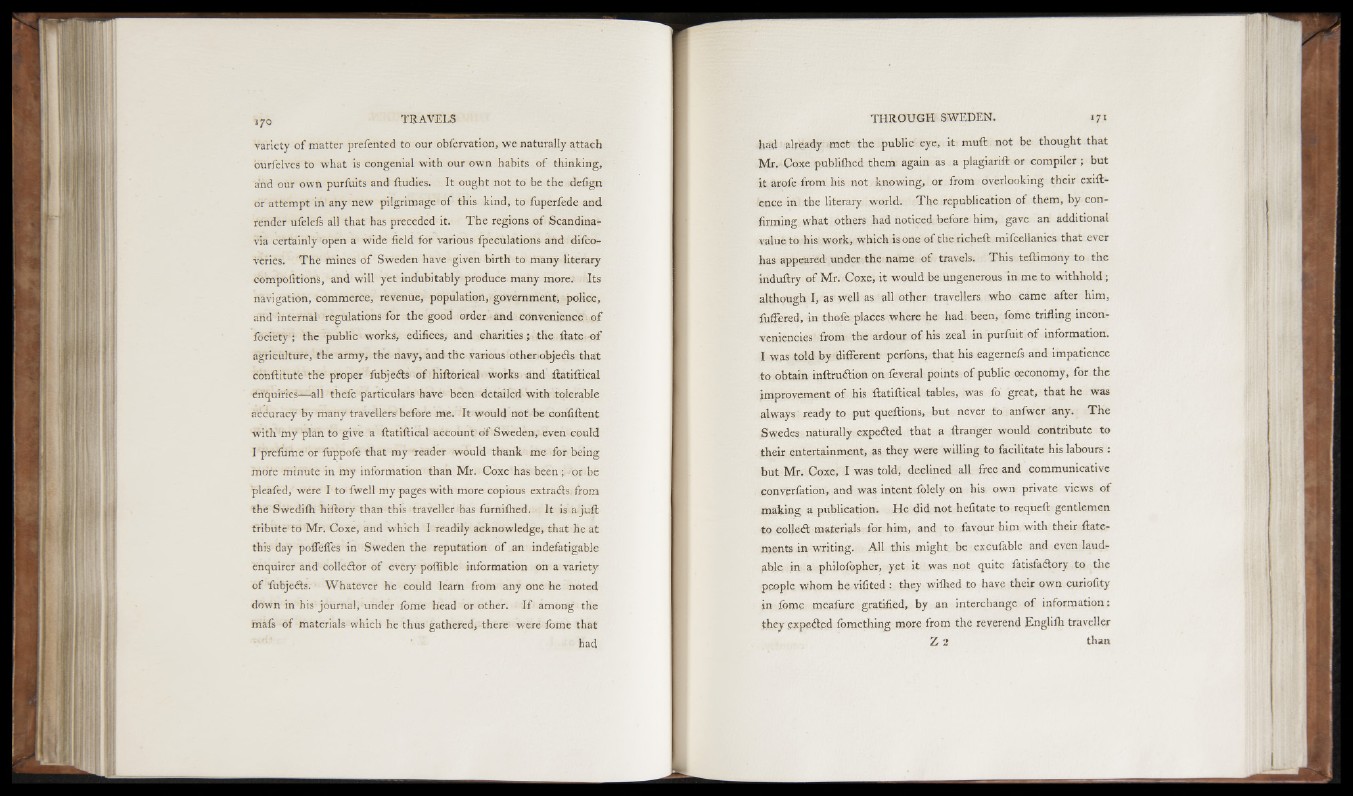
variety o f matter prefented to our obfervation, we naturally attach
burfelves to what is congenial with our own habits o f thinking,
and our own purfuits and ftudies. It ought not to be the deiign
or attempt in any new pilgrimage o f this kind, to fuperfede and
render ufelefs all that has preceded it. The regions o f Scandinavia
certainly open a wide field for various fpeculations and difco-
Veries. T he mines o f Sweden have given birth to many literary
compofitions, and will yet indubitably produce many more. Its
navigation, commerce, revenue, population, government, police,
arid internal regulations for the good order and convenience o f
fociety ; the public works, edifices, and charities; the ftate o f
agriculture, the army, the navy, and the various other objeds that
conftitute the proper fubjeds o f hiftorical works and ftatiftical
enquiries— all thefe particulars have been detailed with tolerable
accuracy by many travellers before me. It would not be confident
with my plan to give a ftatiftical account o f Sweden, even could
I prefhme or fuppofe that my reader would thank me for being
mofe minute in my information than Mr. Coxe has been; «or be
pleafed, were I to fwell my pages with more copious extrads. from
the Swediih hiftory than this traveller has furniihed. It is a ju ft
tribute to Mr. Coxe, and which I readily acknowledge, that he at
this day poflefles in Sweden the reputation o f an indefatigable
enquirer and colledor o f every poffible information on a variety
o f iubjeds. Whatever he could learn from any one he noted
down in his journal, under fome head or other. I f among the
riláis o f materials which he thus gathered, there were fome that
had
had already met the public eye, it muft not be thought that
Mr. Coxe publiihed them again as a plagiarift or compiler ; but
it arofe from his not knowing, or from overlooking their exift-
ence in the literary world. T he republication o f them, by confirming
what others had noticed before him, gave an additional
value to his work, which is one o f the richeft mifcellanies that ever
has appeared under the name o f travels. This teftimony to the
induftry o f Mr. Coxe, it would be ungenerous in me to withhold;
although | as well as all other travellers who came after him,
fuffered, in thofe places where he had been, fome trifling incon-
veniencies from the ardour o f his zeal in purfuit o f information.
I was told by different perfons, that his eagerneis and impatience
to obtain inftruftion on feveral points o f public oeconomy, for the
improvement o f his ftatiftical tables, was fo great, that he was
always ready to put queftions, but never to anfwer any. T he
Swedes naturally expe&ed that a ftranger would contribute to
their entertainment, as they were willing to facilitate his labours :
but Mr. Coxe, I was told, declined all free and communicative
converfation, and was intent fblely on his own private views o f
making a publication. He did not hefitate to requeft gentlemen
to col left materials for him, and to favour him with their ftate-
ments in writing. All this might be excufable and even laudable
in a philofopher, yet it was not quite fatisfaftory to the
people whom he vifited : they wiihed to have their own curiofity
in fome meafure gratified, by an interchange o f information:
they pxpefted fomething more from the reverend Englifli traveller
Z 2 than